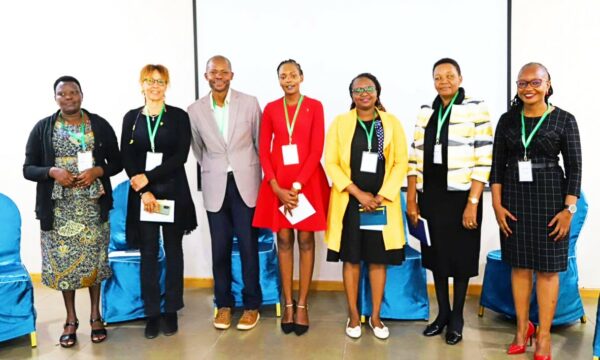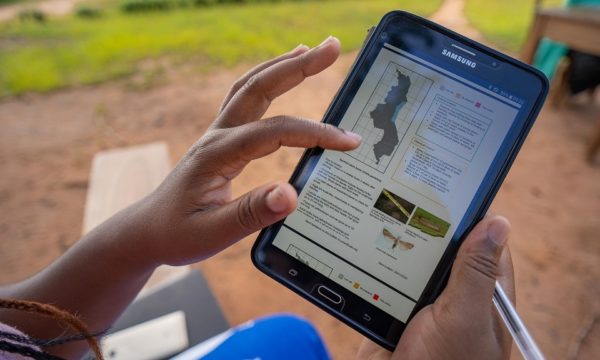
Brian Siame shows plant health conversations between plant doctors in the Zambia Telegram group (Photo: David Onyango, CABI)
After 2 hours drive, we arrive in Rufunsa District located approximately 150 kilometres east of the Zambian Capital, Lusaka. After exchanging pleasantries we settle down with Brian Siame, a trained plant doctor and one of the participants in our survey to find out more about plant doctor requirements for pest alert messages.
After a brief explanation of how PRISE will work, Brian was taken through the survey and its relevance to his role. “The pest forecast messages will be sent to plant doctors like you so that you can provide farmers with timely advice and help them manage local pest outbreaks,” explained Abigail Rumsey from CABI. “The alerts will take the form of short text messages, advising on predicted pest life stage and risk level, with the possibility of including the pest image to help ease identification and diagnosis”.
Brian is one of many plant doctors running plant clinics using tablets in Zambia, Kenya and Ghana (the PRISE project focus countries). In addition to accessing timely and reliable up to date plant health information, Brian and his colleagues can now also easily communicate and exchange knowledge via Telegram- a social networking and messaging application in their electronic devices.
“This Telegram application helps me to communicate with other plant doctors who are part of the group. Despite the long distance between us, we regularly share pictures of pests or diseases and help each other diagnose. A good example is when we had the outbreak of Tuta absoluta and most recently the Fall Armyworm”, said Brian. Plant doctors in Ghana are also using the application to communicate and share plant health knowledge using their electronic devices.
Apart from receiving pest alert messages, it is envisaged that plant doctors will also use the application to give real time feedback from their observations on the ground, which will improve PRISE accuracy on pest forecasting.
“Being able to predict will not only allow for timely control of pests, but will also make me be more confident when I give advice to farmers. I see myself being more proactive than reacting to farmers after the pest has already caused damage to the crops”, added Brian as we concluded the interview.
Ninety-two plant doctors from Kenya (57) and Zambia (35) took part in the user research. Findings will help guide pest risk forecast message development and ensure that the alerts sent to plant doctors remain simple, actionable and in a format that is easily accessible and understood.
PRISE is funded by the International Partnership Programme (IPP) which is run by the UK Space Agency. IPP focuses strongly on using the UK space sector’s research and innovation strengths to deliver a sustainable economic or societal benefit to emerging and developing economies around the world.
1 Comment
Leave a Reply
Related News & Blogs
Early pest warnings and IPM advice are improving food security for maize farmers in Ghana
Pest warnings are changing the way that smallholders in Ghana farm. Smallholder maize farmers in Ghana have long grappled with the challenges posed by crop pests. Over the past few years, this has included the notorious fall armyworm. This voracious in…
14 November 2023





Nice piece of information